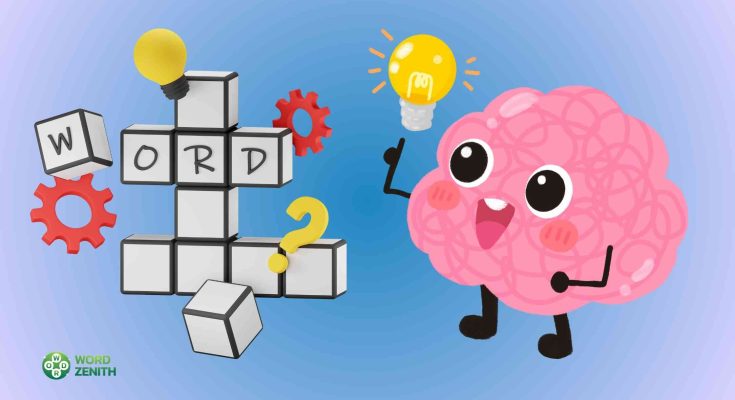Humans have been loving word games and puzzles for a very long time. All the way from crossword puzzles to Scrabble, they’ve been around forever. There’s something about these challenges that make them more than just fun: they stimulate our brains in ways nothing else can.
But what exactly is going on inside our heads?
What makes us love rearranging the letters in words so much? And why do we get such a kick out of knowing we solved that tricky puzzle others couldn’t? In this article, I’m going to dig deep into this fascinating topic and tell you all about the relationship between your brain and word games, diving into the science behind why you love these things so much.
The Appeal of Word Games
1. They Keep Your Brain Sharp
Word games aren’t just fun—they’re good for you too. They challenge many different parts of your brain like memory, attention span, and problem-solving skills. When you play word games your brain has to work hard to connect information and come up with strategies to beat obstacles in your way. This mental stimulation isn’t just enjoyable; it’s also super helpful when it comes to maintaining cognitive functions.
2. You Get A Sense Of Accomplishment
Solving any type of puzzle feels great—but solving a challenging one that everyone else gave up on feels even better! This sense of accomplishment can be addicting sometimes (in a good way). The more difficult the puzzle or task at hand, the greater amount of dopamine gets released into your system when you finally solve it.
Dopamine is a neurotransmitter that gives feelings of pleasure and reward. That warm fuzzy feeling you get after solving something hard is what keeps us coming back for more challenges.
3. It Helps You Escape From Reality
Sometimes we don’t want to think about real life stuff—sometimes we just want to relax with some puzzle fun. Word games give us that opportunity to forget about everything else going on. By focusing solely on the task at hand, we can let our minds loose and explore creative and enjoyable activities. This type of relaxation is great because it allows us to temporarily escape from the stresses of daily life.
The Psychology Behind Word Games
1. They Train You To Spot Patterns
Pattern recognition is a huge part of word games. Whether it’s noticing letter combinations or themes in clues, your brain excels at figuring out patterns even when you don’t realize it. Training yourself to recognize these things not only helps you win word games but also real-life scenarios too. Think about it: how many times have you used pattern recognition for language acquisition or decision-making?
2. Your Vocabulary Will Expand
If you play enough word games, you’ll inevitably learn a ton of words! These games are always throwing weird ones at us; we seem to memorize them easily without even trying! It’s awesome that all this exposure is happening though because being exposed to new words and their meanings expands language skills and lets us appreciate linguistic nuances more deeply.
3. They Make You More Creative And Flexible In Problem Solving
There’s no one “right” way to solve a puzzle—just like there’s no one “right” way to generate an idea. Anytime someone presents a challenging puzzle, everyone has their own unique approach they take to solve it which makes things really interesting sometimes (even if they don’t get the answer right).
So when something isn’t clicking in your brain during a game or challenge, consider switching up your perspective before giving up completely—there may be another solution hiding somewhere in your head!
4. Plasticity Of The Brain
Neuroplasticity, or the brain’s capacity to reorganize and form new neural connections throughout life, is key to our enjoyment of word games. Participating in mentally stimulating activities—such as puzzles—encourages neuroplasticity by testing existing neural pathways and helping create new ones. This flexibility bolsters cognitive function, protects overall brain health and boosts resilience.
Tangible Word Game Benefits
Here are some practical benefits word games offer across a range of areas:
1. Language Skill Development
Word games can help you improve your language skills: spelling, grammar and vocabulary. These gains can transfer to everyday conversations, writing tasks and academic pursuits for enhanced linguistic competency.
2. Cognitive Upkeep
By working the brain like muscles, word games jog mental agility and offset age-related cognitive decline. Regular exposure to novel challenges helps maintain healthy cognition — with reduced risk of cognitive impairment.
3. Socializing
Many word games are group activities that build interaction among participants. Playing together is an opportunity for socializing, bonding over shared goals through competitive or cooperative play.
Read More: Word Games as a Bridge to Mastering Language Fluency
Final Remarks
The lasting appeal of word games lies in their ability to engage the human mind in many ways at once. There’s more than fun at play here; from boosting emotional well-being to being a conduit for forming friendships with fellow players who share similar interests.
By nurturing innate cognitive abilities such as creativity and encouraging neuroplasticity through linguistic puzzles we enrich our lives with learning opportunities that promote cognitive vitality throughout life.
So next time you find yourself absorbed by crosswords or Sudoku puzzles, remember that they’re not just a leisurely hobby — your brain is doing serious work while having fun!




